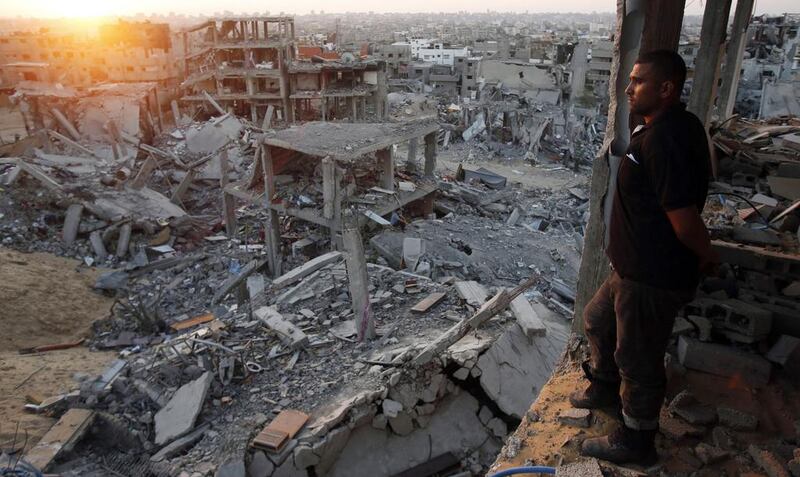ABU DHABI // A large team from the United Nations Relief and Works Agency (UNRWA) for Palestine Refugees in the Near East is to start rebuilding efforts in the Gaza Strip thanks to a recent donation of $41 million (Dh150.6m) from the UAE.
The money will be used to repair homes destroyed by the Israeli attacks, said agency spokesman Adnan Abu Hasna.
A team of experts will start a damage-assessment survey in several affected areas in Gaza to begin the construction.
He said the hundreds of engineers and researchers faced a difficult job because of the unexploded ordinance left over from the war, but they had been trained to deal with the hazard.
They hope to finish the reconstruction project before the winter.
Mr Abu Hasna said the agency would also launch a campaign to raise cash so those who had been displaced could rent houses.
The agency said more that 55,000 people had lost their homes and are currently housed in 36 schools run by UNRWA.
There is also the problem of helping children to overcome the trauma of the Israeli attack.
“UNRWA has developed a three-phased approach to address the educational and psycho-social needs of Gaza students and to enable them to move through a structured and supportive process towards normal schooling,” said Chris Gunness, a UNRWA spokesman.
The first phase would include psychological support and recreational activities for the children at the start of the school year, followed by a transitional phase where academic subjects would be slowly reintroduced.
The third phase would revert to the normal school subjects, with specialised interventions for those pupils with additional needs.
“UNRWA’s education infrastructure has been severely damaged,” Mr Gunness said.
“During the conflict, an estimated five school buildings were severely damaged and now require major reconstruction. In addition, the 90 schools that have served as shelters will require rehabilitation work and targeted interventions in order to be fully functional in time for the start of the school year,” he said.
Approximately 13 per cent of the housing stock has been affected in the Gaza Strip, according to the United Nations Office for the Coordination of Humanitarian Affairs (OCHA).
“Five per cent of the housing stock is uninhabitable. An estimated 18,000 housing units have been either destroyed or severely damaged, leaving more than 108,000 people homeless. This is in addition to the pre-crisis housing deficit of 71,000 housing units, due to people living in overcrowded or inadequate conditions,” said an OCHA spokesman.
The UNRWA is also starting a programme of cash distributions ranging between $125 and $170 for about 14,000 families, Mr Gunness said.
“In that programme, 830,000 people receive food and a further 60,000 will be added. In addition, people whose homes were destroyed will receive an initial one-off payment of $500.”
The Emirates Red Crescent is also distributing 3,000 aid relief baskets. The relief is the fourth to come through Gaza, with 20 lorries loaded with food items, clothes, blankets, hygiene kits, plus baby clothing and food.
The aid was distributed to families in shelters or those who had returned to their homes.
The director of the ERC office in Gaza, Emad Abu Al Laban, said the aid was distributed to families who had not received aid previously.
He said the ERC would try to reach as many needy families as possible.
aalkhoori@thenational.ae






